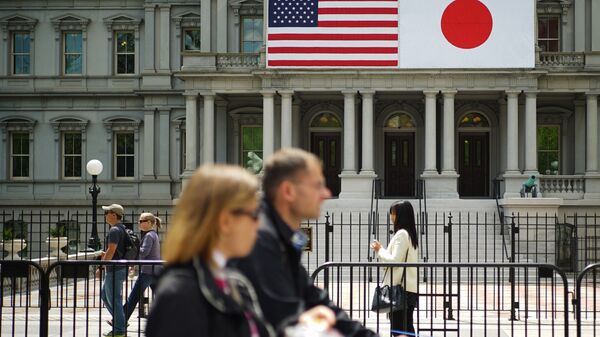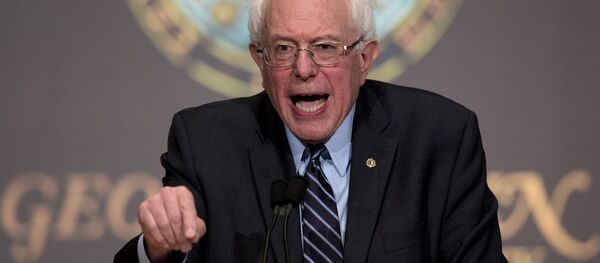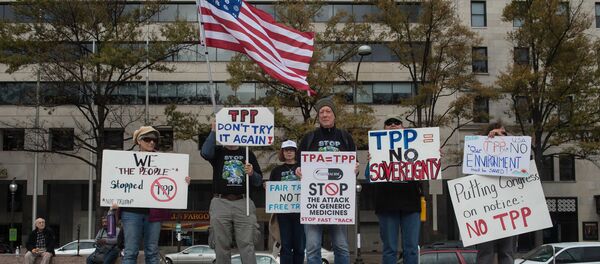Kristian Rouz — The Japanese government says it might soften its stance on bilateral trade with the US, possibly allowing increased imports of agricultural goods and automobiles from the country, in exchange for exemptions from industrial metal tariffs, as well as other trade preferences.
This comes amid concerns about disruptions in international trade ties, caused by the ongoing trade dispute between the world's two largest economies, China and the US.
READ MORE: To TPP or Not to TPP: Trump May Rekindle Abandoned Pacific Trade Partnership
At the same time, Japan is persistently calling on the US to re-join the Trans-Pacific Partnership (TTP) talks,with warnings against what it calls a protectionist approach to foreign trade.
"Whether it's TPP or a free trade agreement (FTA), you need to negotiate similar issues," an anonymous official at the Japanese Finance Ministry said, as quoted by Reuters. "What's important is what you want to achieve, be it TPP or FTA."
The IMF's remarks come amid criticism from US Treasury Secretary Steven Mnuchin, who said the Fund could do a better job managing international trade discrepancies by enforcing more prudent policy guidance, aimed at economies involved in abusive trade practices.
"Bilateral talks alone can't solve imbalances. It's therefore more efficient to solve them within a bigger framework," IMF Deputy Managing Director Mitsuhiro Furusawa said. "In general, a multilateral framework is more efficient for the global economy."
Furusawa is a former Japanese currency policymaker, who played a role in several mild devaluations of the yen. Such measures have allowed for a greater competitiveness of the Japanese exports worldwide, but arguably contributed to the global trade imbalances.
READ MORE: US May Seek to Rejoin TPP to Survive Trade War With China — Expert
Japanese government officials say, however, that Tokyo is open to striking a bilateral trade deal with the US, as long as the deal's terms are favourable for Japan and are mutually beneficial in the longer run.
"It's better to focus on ways to reduce the US trade deficit with Japan," according to another Japanese official, as quoted by Reuters. "Japan is already buying a lot of goods from the United States. It can promise to buy more."
Japan is currently running a significant trade surplus with the US, particularly in automobiles, electronics and other technology, as well as industrial metals. Japan also is one of the world's largest holders of US government debt, which makes it exposed to possible negative developments within the US economy.
Meanwhile, Japanese Prime Minister Shinzo Abe confirmed that negotiations over a possible trade deal with the US will commence shortly. Abe said while Tokyo might not be ready to fully commit to a bilateral deal quite yet, a trade agreement in this form or another could be reached soon.
"We have agreed to start talks for free, fair and reciprocal trade deals," Abe said. "On the US side, they are interested in a bilateral deal. Our country's position is that TPP is the best for both of our countries."
Some observers point out the resulting deal could be a compromise, as the US has been weighing renegotiating the TPP on more beneficial terms, which would also ensure America's leading role in Trans-Pacific trade, aimed at countering China's aspirations in the region.
READ MORE: Trump Says WTO, TPP Not Serving US Interests, Bilateral Deals More Profitable
Publicly, however, US officials have so far dismissed the speculation of re-joining the TPP, with President Trump sending contradictory signals on the matter.
"I don't want to go back into TPP, but if they offered us a deal that I can't refuse on behalf of the United States, I would do it," Trump said. "But I like bilateral better," he added.
Eventually, a set of bilateral deals between the US and each of the TPP signatories could from a basis for an updated TPP.





